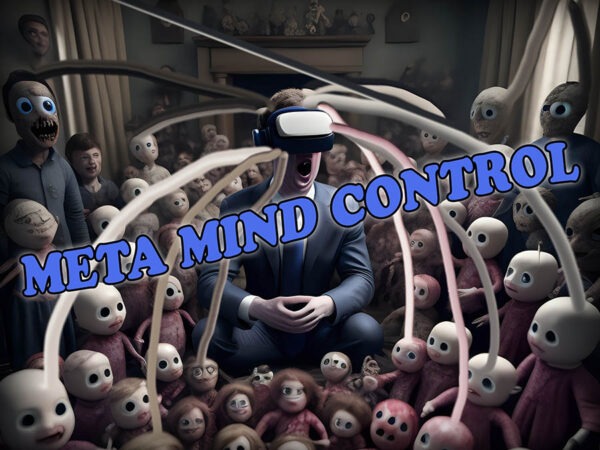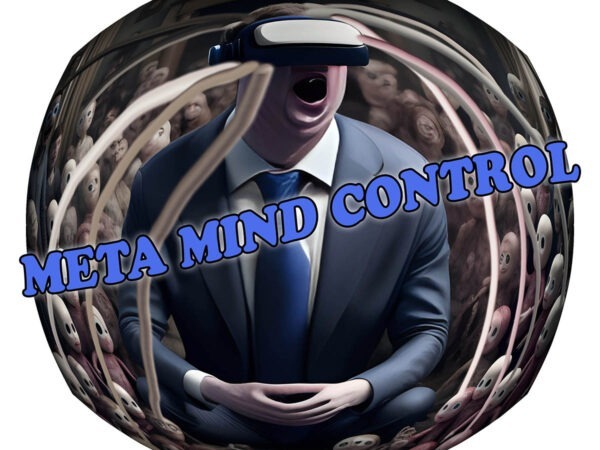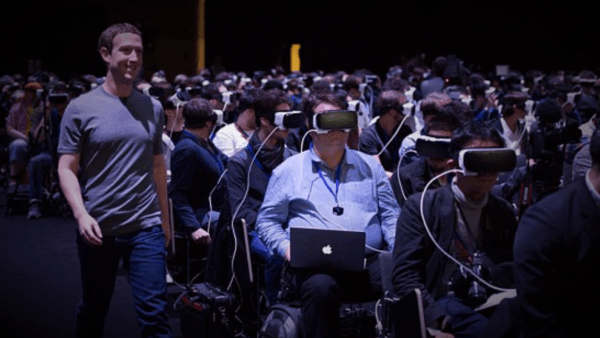Mind-Reading Technology: the Potential Dangers of Facebook Meta’s Latest Advancements:
In recent developments, Facebook Meta has introduced groundbreaking technology that claims to read users’ thoughts through noninvasive sensors embedded in their headsets. While this may seem like a leap into the future, the potential dangers associated with mind-reading technology warrant a thorough examination. This academic blog post seeks to dissect the risks, ethical implications, and potential abuse scenarios that could arise from such technological advancements.

Manchurian VR headset – Everybody can be a Manchurian Candidate!
1. Bi-Directional Communication: The Double-Edged Sword
One of the primary concerns is the bidirectional capability of the technology. While it promises to decode and understand users’ thoughts, the ability to also insert thoughts into the user’s mind introduces a host of ethical and privacy issues. The risk of unwanted influence, manipulation, or even coercion becomes a significant consideration.
The Dark Side: Mind Control Concerns
While the potential applications of Meta’s AI breakthrough are awe-inspiring, a shadow looms over the horizon, casting doubt on the ethical implications surrounding the technology’s bidirectional communication capabilities. This facet raises profound concerns about the potential for misuse, specifically in the realm of mind control.
The Insidious Potential for Manipulation:
The bidirectional communication inherent in Meta’s mind-reading technology holds the key to a Pandora’s box of potential nefarious uses. Delving into the darker recesses of imagination, one can envision scenarios where this technology might be exploited to alter people’s perceptions, control their thoughts, and manipulate their behaviors.
Meta’s AI Breakthrough: Decoding Visual Representations and the Ethical Implications
1. Commercial Exploitation:
- Advertisers armed with the ability to decipher thoughts could tailor advertising content with unprecedented precision. This goes beyond mere customization; it’s the potential to implant desires, creating a consumer base driven by suggestions inserted directly into their subconscious.
2. Political Propaganda and Influence:
- In the political landscape, the technology could be weaponized to sway public opinion. Crafting political narratives and ideologies that align with specific agendas might extend beyond conventional advertising tactics, infiltrating the very fabric of individual beliefs.
3. Innocent Unwitting Agents:
- Drawing inspiration from fictional narratives like ‘The Manchurian Candidate,’ there’s a chilling prospect of innocent individuals being unwittingly turned into agents of unintended consequences. Covertly manipulating thoughts and behaviors could potentially create unsuspecting pawns in geopolitical or corporate power plays.
4. Manufacturing Social Unrest:
- By manipulating collective thoughts and sentiments, this technology might be exploited to manufacture social unrest or dissent. The ability to influence a population’s perceptions of events could be wielded as a tool for sowing discord or diverting attention from critical issues.
5. Creation of Unintentional Threats:
- Perhaps the most chilling prospect lies in the unintended consequences of mind control. Individuals, under the influence of external forces, might inadvertently pose threats to themselves or others, all without awareness or consent.
6. Cultural and Ideological Domination:
- The ability to manipulate thoughts extends to influencing cultural narratives and ideological landscapes. This could lead to a dystopian scenario where dominant powers shape collective beliefs and erase dissenting voices, stifling diversity and innovation.
2. Privacy Erosion: From Personal to Corporate Control
With the ability to decipher thoughts comes the inevitable erosion of privacy. Users’ most intimate and personal thoughts are at risk of being exposed, creating a new frontier for privacy invasion. Beyond the individual, the potential for corporations to exploit this information for targeted advertising and behavioral manipulation is a considerable concern.

Portrait of a Privacy Killer
3. Media Tailoring and Influencing Behavior
The integration of media tailored to users’ thoughts poses a unique threat. Advertisements, news, and other content can be customized to align with users’ innermost desires or fears. This level of tailored content could be weaponized for corporate gain or, in more sinister scenarios, to control public opinion.
4. Mind Control in Political Contexts
The intersection of mind-reading technology and political influence raises alarming possibilities. Rogue nations or unethical corporations could leverage this technology for political gain, manipulating public opinion, or even creating what could be termed as ‘mind-controlled’ individuals. The potential for these tools to be used in information warfare cannot be underestimated.
5. The Need for Ethical Frameworks and Regulation
As we currently sail uncharted waters in this new technological development, and the implications of mind-reading technology, the importance of establishing ethical frameworks and robust regulations cannot be overstated. Safeguards against abuse, guidelines for consent, and limitations on the use of this technology must be established to protect individuals and societies from unintended consequences. The advent of mind-reading technology by Facebook Meta brings with it unprecedented opportunities and risks. While the technology’s potential benefits are clear, the dangers of unintended misuse, from corporate exploitation to political manipulation, demand immediate attention.
This article serves as a call to action for the IT community, policymakers, and the public to engage in a collective effort to establish ethical guidelines and regulations to mitigate these risks before they become a reality. Only through a comprehensive and proactive approach can we ensure that this powerful technology is harnessed for the greater good rather than manipulated for nefarious purposes.








 The idea i believe, is that Facebook can create masses of automated content and overtake all the other major domains with all types of media (in this case, video, which would directly affect YouTube, which
The idea i believe, is that Facebook can create masses of automated content and overtake all the other major domains with all types of media (in this case, video, which would directly affect YouTube, which 






